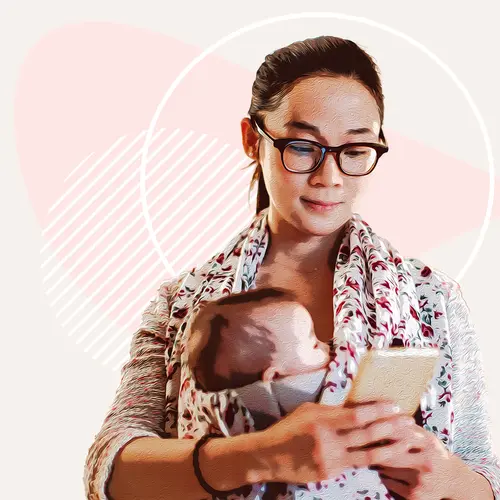The second part of your child's first year is filled with so many developmental changes that you may feel you need a constantly running video camera to record them all.
So what should your baby be doing, and when? Katherine Connor, MD, a pediatrician at the Harriet Lane Clinic of Johns Hopkins Children's Center, says babies tend to develop "from the top down and from the middle out." So while your baby spent his first six months getting control of his big, floppy head and his midsection -- learning to roll over -- he'll spend the next six perfecting the use of his increasingly dexterous fingers and learning to get mobile.
Connor urges parents to remember that all babies develop skills at their own pace. "There is a wide range of normal," she says. "Many parents worry, for example, if their baby isn't walking by a year, but in fact many babies don't walk until well past their first birthday. What you want to see is continuous progression forward." Here are some of the changes you can anticipate:
6 Months
Gross motor skills: Sits up on his own -- without being propped -- if you get him into a sitting position.
Fine motor skills: Transfers objects from one hand to the other
Language skills: Babbles in a way that can sound tantalizingly like real words -- "mama," "dada," "baba."
Social skills: Responds to you by looking toward you or smiling at you when you say his name.
7 Months
Gross motor: Tries hard to move forward by scooting or "army crawling," or rocking back and forth on all fours.
Fine motor: Begins to scoop up small objects using a "rake grasp," sweeping with all the fingers
Language: Imitates sounds you make to him, like raspberries, babble talk, and laughter.
Social: Starts to enjoy eye contact and games like peek-a-boo.
8 Months
Gross motor: Gets into a sitting position on his own. Babies who do crawl usually start about now. (Not all babies crawl -- don't worry if yours doesn't.)
Fine motor: Plays at picking up and dropping objects.
Language: Some babies start using babble words like "mama" and dada" to refer to people. Don't be surprised if he calls both parents "dada" for awhile.
Social: Learns to understand object permanence -- that things still exist when he can't see them. That may mean the start of separation anxiety, but don't be concerned. Babies grow out of this phase.
9 Months
Gross motor: Tries to pull himself up to a standing position using furniture and other objects.
Fine motor: Has mastered the rake grasp -- picks up objects with all four fingers engaged.
Language: Uses a lot of gestures like pointing, shaking his head, and nodding to communicate.
Social: Stranger anxiety has kicked in. Babies who were happy going to a trusted sitter may suddenly melt down. This, too, shall pass.


